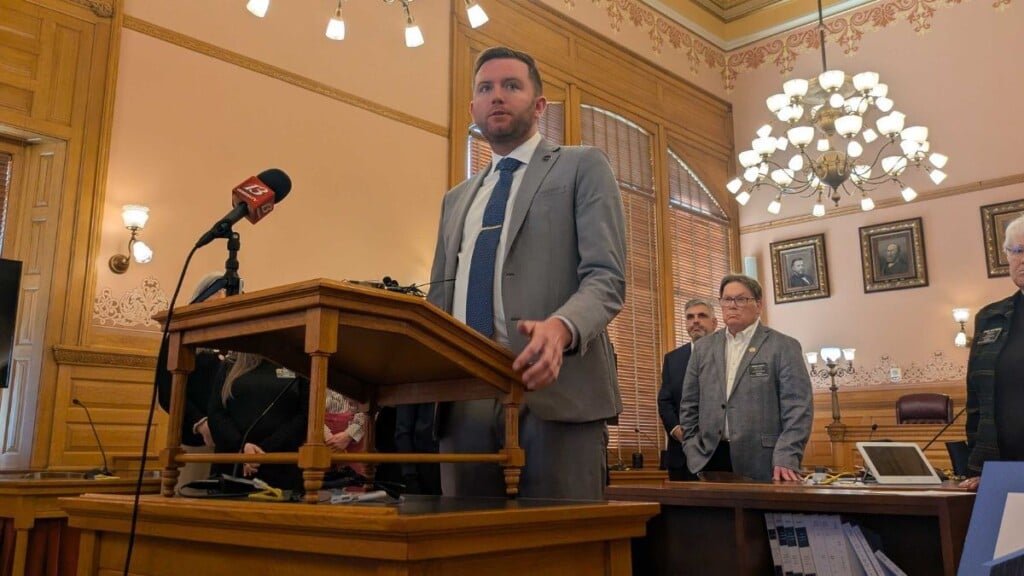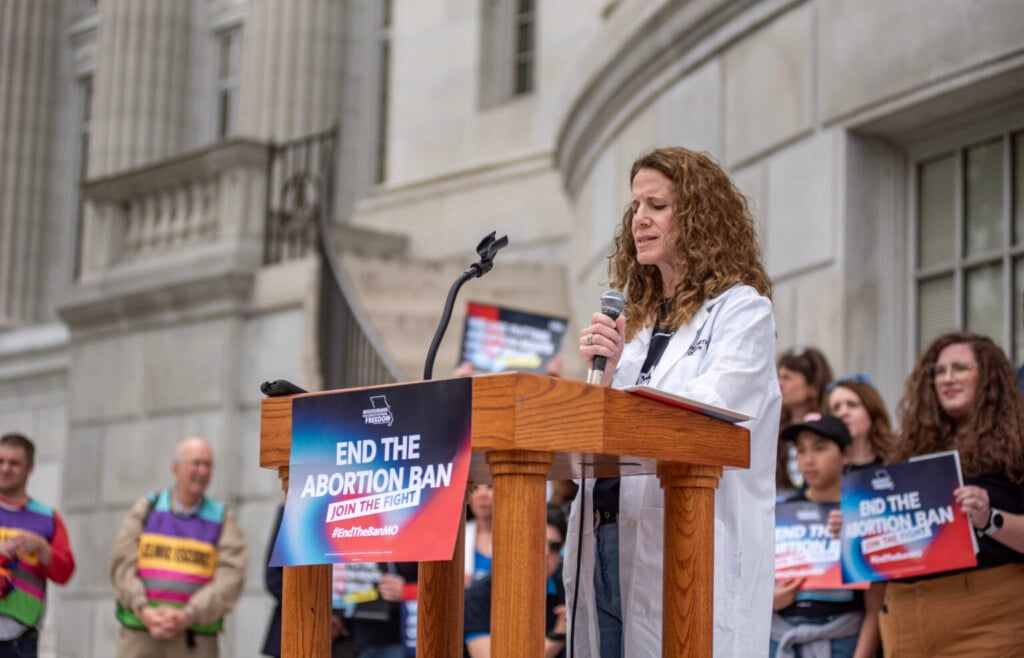In failing to protect voting rights, the Kansas Supreme Court reserves the right to be wrong

Elisabeth Frost, representing League of Women Voters, gives a rebuttal to a question in her Kansas Supreme Court argument during the hearing of League of Women Voters, et al v. Schwab in 2023. (Pool photo by Evert Nelson/Topeka Capital-Journal)
One hundred and sixty-five years ago come Friday, the Kansas Constitution was adopted by voters. The document had been framed the sweltering summer before in an unfinished brick building between the Kaw and Missouri Rivers in recently organized Wyandotte County.
The document is still being debated today.
Some opinions, of course, are more important than others.
In 2022, for example, Kansas voters were asked — just six weeks after Roe v. Wade was overturned — to decide on an amendment to declare abortion unprotected by the state constitution. Kansans overwhelming voted to keep the right to abortion.
The Kansas referendum came after the U.S. Supreme Court ended the decades-long precedent of Roe, effectively sending the issue back to the states to decide. Since then, 14 states have adopted abortion bans. But reproductive rights isn’t the only issue on which the high court has created a legal vacuum for states to fill. In 2013, it gutted provisions of the 1965 Voting Rights Act, and many states created new laws making it harder to vote.
Claims of a stolen presidential election in 2020 prompted some states to adopt more restrictive voting measures. These laws were ostensibly aimed at combatting voter fraud — which in reality was and is shockingly rare — but instead tended to disenfranchise minority voters.
In 2021, the Kansas Legislature passed a ballot signature verification mandate and other measures that became the target of lawsuits challenging the state constitutionality of the new laws. In May 2024, the Kansas Supreme Court ruled 4-3 that voting is not a fundamental right guaranteed by the state constitution.
Instead, according to the majority opinion, voting is a “political right.”
This jaw-dropping decision is at odds with interpretations of the constitutions of nearly every other state and sets a risky precedent in a time of extreme political turbulence. In it, the majority on the Kansas Supreme Court has asserted its right to be wrong — legally, historically, and morally.
Declaring voting to be a political instead of fundamental right weakens voting because it creates a lower standard of protection. It is also a dangerous and regressive opinion that threatens the “one person, one vote” standard for democracy first articulated by U.S. Chief Justice Earl Warren in 1963.
“People, not land or trees or pastures vote,” Warren said.
That means there should be equal representation based on population, not geography. Kansas settled this problem in the 1960s, thanks to some nudging from a Pulitzer Prize-winning campaign by the Hutchinson News, by changing the way legislative districts were apportioned. For about a century before, representation was disproportionately weighted in favor of the state’s rural areas.
Moral questions about voting were also preeminent when the Wyandotte Constitution was adopted. The issue was not only whether Kansas should enter as a Free State, but also who would be able to vote on statehood. Did you have to be a resident of Kansas Territory to vote, or could Missourians (who were predominately pro-slavery) simply declare their intent to settle in Kansas and be allowed to vote? And if Kansas was admitted as a Free State, would women, Black people, and Native Americans be granted suffrage?
The Wyandotte Constitution succeeded where three previous attempts, during the turbulent Bleeding Kansas years leading up to the Civil War, had failed. It succeeded not because it was a bold document, but because it was mild, resembled other constitutions from rural free states, and because the timing was right.
The Wyandotte Constitution was written during the violent prelude to the Civil War in which the question of whether Kansas would enter the union as free or slave-holding polarized the nation.
The constitution was drafted on the top floor of a rambling four-story brick building overlooking the Missouri River, recalled abolitionist journalist William A. Phillips.
“I remember the appearance of that old building quite well,” Phillips recounted in a piece republished in 1891 by the Kansas City Gazette. “It had quite a citified air, rising in four-story brick grandeur, and looking as if, in a fit of abstraction, it had wandered away from New York or Philadelphia and was looking from its four-story eyes at the cows and pigs which were picking up a scanty livelihood from the dirty, stunted grass.”
Phillips was born in Scotland but emigrated with his parents, who settled in Illinois. From 1845 to 1862 he was a correspondent for the eastern abolitionist press. He also practiced law at Lawrence and, later, was a colonel in command of a home guard Native American regiment during the Civil War.
The building was unfinished, Phillips recalled, with unplastered walls and rough-hewn stairs that passed by a room serving as a territorial courtroom and another that was a tavern. The convention met beneath the pitched roof on the top floor, where a spray of stars-and-stripes bunting relieved the general “dreary brickiness.” And it was hot in the summer of 1859, so hot that Phillips said the constitution could be said to have been cooked there.
If the building had a name, Phillips does not mention it, although the Kansas City Public Library website identifies it as the Lipman Meyer building in old Kansas City, Kansas. The building, which was never finished, collapsed in 1861.
The rude location where the state constitution was birthed, Phillips said, reflected the document’s modest ambitions. None of the leading proponents of abolition were in attendance. They either had other obligations or were simply uninterested in attending what promised to be a convention of compromise.
“It was conceived in poverty and brought forth in weakness, and went forth to the people without the shadow of a single pillar or cornice to frown down the audacity of criticism,” Phillips said.
The constitution, Phillips said, had a “preamble and a tail.” There were articles creating the legislative, executive and judicial branches, and a bill of rights, which Phillips called “in part a bill of wrongs.” The constitution prohibited slavery in the new state, but failed to grant Black individuals and Native Americans the right to vote. It permitted women to own property and vote in school board elections. It also lopped off the western tail of the territory, which extended to the Continental Divide in modern-day Colorado.
Phillips, a cynic whose account is colored by his disappointment, felt constitutional law was more ornamental than useful. “The legislature constantly violates it” he wrote, “and the judges put such construction on it as they please.”
The Wyandotte Constitution, despite the flaws Phillips and others saw in it, was adopted by public vote by a margin of 2-1 on Oct. 4, 1859. It was then sent to the U.S. Congress, where it eventually passed because of weakened opposition; the secession of southern states, beginning in 1860, left several vacant Senate seats.
President James Buchanan signed the bill granting Kansas statehood on Jan. 29, 1861. Abraham Lincoln, who was president-elect, wouldn’t take office until March 4.
The forces at work in Kansas and elsewhere today would be recognizable to those who helped midwife the Wyandotte Constitution. The question of who should vote and how remains central to our experiment in democracy.
These are the questions that continue to haunt.
While minorities have the right to vote, is it meaningful if so many roadblocks are thrown up that voting is impractical or impossible? How should an election official judge the integrity of a signature on an advance ballot? If abortion has been banned in a woman’s state, should she be prosecuted for traveling to another state to seek reproductive care?
From what fundament do we draw our basic human rights?
May’s Kansas Supreme Court majority opinion asserts an emphasis on delegated power. The constitution is the instrument through which power is delegated, and that delegation includes appointments of unelected officers. Delivering the opinion for the majority, Justice Caleb Stegall said there is no constitutional guarantee of a fundamental right to vote.
“In constituting the state, (the people) were not blind watchmakers, content to wind a clock and simply let it run,” Stegall wrote. “Ours is not a self-perpetuating state — it is neither hereditary nor does it enjoy the power to elect its own successors … the people intended to continue constituting that state, at regular intervals, through ongoing and perpetual subordinate acts of delegation. We generally call such acts of ongoing delegation ‘elections’ and ‘appointments.’”
For more on blind watchmakers, see Richard Dawkins.
The three dissenting opinions were blistering.
“Today the court majority strips Kansans of our founder’s ultimate promise that the majority will rule and that the government it empowers will answer to its calls,” wrote Justice Eric Rosen, in a mixed dissent. “It staggers my imagination to conclude Kansas citizens have no fundamental right to vote under their state constitution. Admission to the United States was predicated on a constitutional guarantee of a republican form of government. Over 160 years later, this court removes that guarantee.”
Justice Dan Biles also expressed alarm.
“The Kansas Constitution explicitly sets forth — and absolutely protects — a citizen’s right to vote as the foundation of our democratic republic, so it is serious business when a government official in one of our 105 counties rejects an otherwise lawful ballot just by eyeballing the signature on the outside envelope.”
And Justice Melissa Standridge:
“At the time (the constitution was adopted), Kansas was a frontier state grappling with issues related to slavery, suffrage, and democratic representation,” Standridge wrote. “From the historical record, it is clear the framers and adopters sought to address these concerns, voting chief among them. … It is hard to imagine the framers and adopters did not mean for this provision to carry any substantive weight in the form of judicially enforceable rights.”
This is serious business indeed.
So serious, in fact, that under the Kansas Supreme Court’s majority opinion, just about any draconian voting law might pass state constitutional muster, as long as it was duly approved by some appointed official somewhere at the head — or in the bowels — of government. That is as close to the scatological as I will allow myself, but perhaps my meaning will be as clear as Stegall’s blind watchmaker analogy.
The state high court ruling did not dismiss the voting case, but sent it back to district court for review. The issues to be reconsidered are the signature requirement on absentee ballots and a prohibition on voter assistance. The plaintiffs in the combined case were the League of Women Voters of Kansas, Loud Light, the Kansas Appleseed Center and the Topeka Independent Living Resource Center.
The lasting impact of the decision will not be whatever the lower court decides, but in the precedent set by the Kansas Supreme Court in declaring voting not a fundamental right.
The majority’s opinion on voting is so disturbing, so wrapped in self-serving and vacuous language with obvious partisan intent, that it is difficult to comprehend the peril it invites. It is the Lipman Meyer building of judicial opinions, one that is certain to eventually collapse of its own weight — and that threatens to bring the rest of us down with it.
Max McCoy is an award-winning author and journalist. Through its opinion section, the Kansas Reflector works to amplify the voices of people who are affected by public policies or excluded from public debate. Find information, including how to submit your own commentary, here.
Kansas Reflector is part of States Newsroom, a nonprofit news network supported by grants and a coalition of donors as a 501c(3) public charity. Kansas Reflector maintains editorial independence. Contact Editor Sherman Smith for questions: info@kansasreflector.com. Follow Kansas Reflector on Facebook and X.




